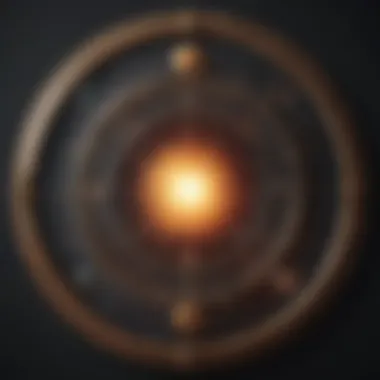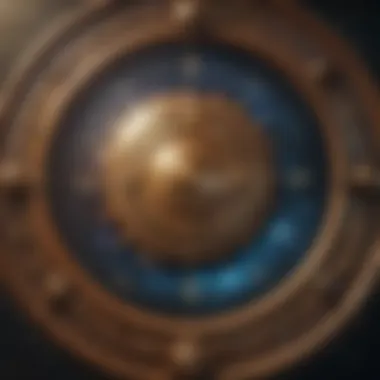Defining Horoscope: An In-Depth Examination of Astrology


Intro
Horoscopes have intrigued humanity for centuries. They embody an intersection of spirituality and science, appealing to various individuals. This exploration seeks to unravel the complexity surrounding horoscopes, presenting a clear understanding of their significance.
Understanding the Zodiac
The concept of the Zodiac forms the backbone of astrology. Each sign represents unique traits and influences, establishing a framework for interpretation.
Overview of Zodiac Signs
The Zodiac consists of twelve signs, each correlating with a segment of the celestial sphere. These signs are:
- Aries
- Taurus
- Gemini
- Cancer
- Leo
- Virgo
- Libra
- Scorpio
- Sagittarius
- Capricorn
- Aquarius
- Pisces
Each sign carries its own narrative, influencing personal development and relationships.
Sign Traits and Characteristics
Understanding traits linked to each sign offers insights into personality dynamics. For instance:
- Aries: Bold and adventurous.
- Taurus: Sturdy and reliable.
- Gemini: Curious and social.
- Cancer: Intuitive and nurturing.
- Leo: Charismatic and confident.
- Virgo: Practical and analytical.
- Libra: Diplomatic and fair-minded.
- Scorpio: Passionate and resourceful.
- Sagittarius: Optimistic and freedom-loving.
- Capricorn: Disciplined and ambitious.
- Aquarius: Innovative and humanitarian.
- Pisces: Compassionate and artistic.
Elemental Qualities
In addition to individual traits, Zodiac signs are categorized into four elements:
- Fire: Aries, Leo, Sagittarius – associated with passion and energy.
- Earth: Taurus, Virgo, Capricorn – linked to practicality and stability.
- Air: Gemini, Libra, Aquarius – representing intellect and socialness.
- Water: Cancer, Scorpio, Pisces – connected to emotions and intuition.
Each element provides a deeper context, highlighting how these signs interact with the world around them.
Astrological Insights
The current landscape of astrology is constantly evolving. Keeping in touch with new trends enhances one's understanding.
Current Astrological Trends
Astrology is not a static domain; it responds to global dynamics. Observing current movements in the planets can guide predictions about social trends and personal experiences.
Influence of Celestial Events
Celestial events, such as eclipses and retrogrades, can have profound impacts on personal and collective experiences.
Preamble to Horoscope
Horoscopes hold a significant place in astrology and are often seen as portals into understanding human nature and personal destiny. They provide insights into one's personality, challenges, and potential paths to follow. This introduction establishes the groundwork for comprehending what horoscopes entail and their relevance in contemporary life.
What is a Horoscope?
A horoscope is essentially a map of the heavens at a specific moment in time, often the time of a person's birth. It charts the positions of the Sun, Moon, planets, and other celestial bodies. Each element of the horoscope suggests various aspects of life, from personality traits to significant life events. Many people refer to horoscopes for daily guidance, basing their decisions on astrological interpretations.
Horoscopes are not merely predictions; they are frameworks that provide an understanding of oneself and the surrounding world. The construction of a horoscope is intricate and requires precise astronomical calculations. It integrates elements from the zodiac signs, planetary positions, and aspects that define the unique characteristics of an individual.
Historical Background of Horoscopes
The origins of horoscopes are deeply rooted in ancient civilizations. The earliest records date back to Babylonian astrology around the 2nd millennium BCE, where astrologers combined astronomical observations with myths and mathematics. They believed celestial movements had a direct impact on earthly events.
As astrology spread through cultures, it evolved. The Greeks, particularly during the Hellenistic period, significantly influenced horoscope development. They merged Babylonian ideas with their philosophies, giving rise to concepts that form the basis of modern astrology. Important figures such as Ptolemy wrote comprehensive texts that codified astrological practices.


Historically, horoscopes served as tools for decision-making and understanding fate, not just for individuals but also for nations. Leaders often consulted astrologers in times of war or political uncertainty. This historical context provides valuable insights into how horoscopes were perceived and the roles they played in shaping societies. Today, while horoscopes may lack the same gravitas, they continue to attract interest for their personal insights and guidance.
In summary, understanding the foundations and historical context of horoscopes fosters a deeper appreciation of their significance in our lives today.
Astrology and Its Foundations
Astrology serves as the backbone of horoscope readings and is essential in understanding their significance in various aspects of life. This section explores how astrology forms a structured framework for interpreting celestial influences and their implications for individuals. By learning about astrology, readers can gain insights into their personalities, behaviors, and potential life paths. With a rich history, astrology provides context that deepens the understanding of horoscopes.
The Principles of Astrology
The principles of astrology are built on the belief that the positions of celestial bodies can influence human affairs. Central to this belief are the ideas of cosmic correspondences and synchronicity. Astrology operates on several core tenets:
- Interconnectedness: Astrology posits that everything in the universe is connected. This connection extends from cosmic events to personal experiences.
- Symbolism: Each celestial body and sign carries specific symbolic meanings. These symbols shape the interpretation of individual horoscopes.
- Cycles: Astrologers believe in cyclical patterns based on celestial movements. These cycles can indicate recurring themes in a person’s life.
These principles make astrology a compelling tool for many. It offers a framework through which people can explore and understand the complexities of their existence.
Celestial Bodies and Their Influence
The influence of celestial bodies goes beyond mere predictions. Understanding these bodies and their roles is crucial for horoscope analysis. Three main components include planets, stars, and houses.
Planets
Planets are instrumental in shaping astrological interpretations. Each planet represents distinct aspects of human experience:
- Personal Attributes: For example, Mercury governs communication, while Venus influences love and relationships.
- Dynamic Interactions: Planets interact with each other through aspects, amplifying specific traits in horoscopes.
- Unique Features: Each planet has a unique energy, with some being more beneficial and some more challenging, adding depth to readings.
The pivotal role of planets in astrology makes it a popular choice among practitioners, as they provide a detailed lens to view oneself and one’s life journey.
Stars
Stars also play a significant role in astrology. They are seen as symbols of guidance and destiny:
- Fixed Nature: Stars are often considered fixed and represent long-term influences in one's life.
- Navigational Importance: Historically, stars guided travelers and continue to symbolize direction and purpose in one’s horoscope.
- Unique Features: Unlike planets, stars do not move as rapidly, leading to a perception of stability in one's chart. This can serve as a context for enduring aspects of an individual’s life.
Incorporating star positions in horoscope readings enriches interpretations, providing depth and a sense of continuity.
Houses
Houses form a crucial aspect of an astrological chart. They represent different life areas, such as career, relationships, and personal growth:
- Divisions of Experience: Each house focuses on specific experiences and challenges a person may face.
- Influences from Planets: The planets situated in certain houses highlight which life areas will be most impacted.
- Unique Features: The houses allow for a more personalized reading, giving a clearer picture of individual life themes.
Understanding houses is vital because they help to outline the context of the planetary influences, making readings relevant and personalized.
In summary, astrology offers a rich tapestry of interconnected principles, celestial influences, and personal relevance. The foundational elements—planets, stars, and houses—create a cohesive framework for interpreting horoscopes.
Constructing a Horoscope
Constructing a horoscope is a vital part of astrology, providing the framework for understanding one's celestial influences. The construction involves several elements that together form a unique astrological map. These components not only assist practitioners in reading and interpreting horoscopes but also give personal insights based on individual birth details.
The steps in constructing a horoscope often reflect astrological beliefs and principles. By understanding these facets, astrologers gain better insight into an individual’s personality, tendencies, and potential life paths.
Key Components of a Horoscope
Zodiac Signs
Zodiac signs are perhaps the most recognizable component of astrology. They represent the twelve segments of the sky, each linked with specific characteristics and traits. Each zodiac sign is associated with different personality attributes, shaping how individuals perceive and interact with the world. The uniqueness of zodiac signs lies in their elemental traits – earth, air, fire, and water.
One key characteristic of zodiac signs is their influence on personal identity. This makes them a popular choice among astrological studies and discussions. Each sign not only marks a distinct personality profile but also provides hints toward personal challenges and strengths. However, the dependency on one’s zodiac sign can become limiting, as it does not encompass the entire complexity of an individual's astrological chart.


Advantages of zodiac signs include ease of understanding and broad public awareness. Disadvantages include a tendency to oversimplify personal characteristics into narrow categories.
Ascendant and Moon Signs
The Ascendant, or rising sign, combined with the Moon sign, plays a critical role in a complete horoscope. These elements add another layer of depth to an astrological reading. The Ascendant signifies the mask one presents to the world, affecting first impressions and social interactions. In contrast, the Moon sign connects to inner emotions and instincts.
This unique combination allows for a more multi-dimensional view of personality traits, enriching the overall astrological interpretation. The popularity of Ascendant and Moon signs can be attributed to their significant impact on emotional responses and external behavior.
Advantages include a more holistic understanding of individuals, while disadvantages may surface if one focuses too heavily on these aspects, disregarding the broader chart.
Planetary Aspects
Planetary aspects are vital for assessing the dynamic relationships between the planets within a horoscope. These aspects reveal how celestial bodies influence each other, shaping various life themes and events. The unique feature of planetary aspects is their ability to highlight both harmony and conflict in astrological interpretations. For instance, a trine aspect usually signifies ease and support, while a square might point to challenges and tension.
The key characteristic of planetary aspects is their emphasis on relational dynamics, which is essential for understanding complex narratives in astrology. Planetary aspects are advantageous for identifying potential challenges and opportunities in different areas of life. However, they do demand significant analytical skills to interpret accurately, making them less approachable for beginners.
The Role of Time and Location
Time and location are critical factors in constructing a horoscope. Every individual's chart is specific to the moment of birth and the geographical location at that time. It is this combination of factors that influences the planetary positions and determines personal traits.
Understanding these elements is crucial for a correct interpretation of one's astrological profile. A birth chart created without precise time and location can lead to inaccuracies in readings, thereby undermining the entire purpose of astrology. Each time zone affects planetary movements, while geographic coordinates provide context for celestial influences.
Effective horoscope construction requires careful consideration of both time and location. Without them, the interpretation may miss key aspects of personal influences.
Types of Horoscope Readings
Understanding the types of horoscope readings is crucial for anyone engaged in astrology. Each type offers unique insights and can serve different purposes in the pursuit of knowledge about oneself and relationships. As we dive into this section, we will explore three key types: Natal Horoscope, Transit Horoscope, and Compatibility Horoscope. Each type presents specific elements, benefits, and considerations, contributing to a more holistic view of how horoscopes can impact personal and relational dynamics.
Natal Horoscope
A Natal Horoscope, also known as a birth chart, is fundamental in astrology. It is created based on the exact date, time, and location of an individual's birth. The Natal Horoscope lays a foundational understanding of one's personality and life path. Here are some key aspects:
- Personal Traits: The chart reveals traits, strengths, and weaknesses that inform how individuals act.
- Life Challenges: Understanding the challenges one may face helps in personal growth and facing obstacles with clarity.
- Opportunities: It highlights potential opportunities that align with personal tendencies, making it easier to capitalize on them.
This type of reading is particularly valuable for self-reflection. It provides profound insights into a person's motivations and behavioral patterns. Engaging with a Natal Horoscope invites individuals to contemplate and make sense of their life experiences through an astrological lens.
Transit Horoscope
Transit Horoscope readings focus on the movements of celestial bodies and how they interact with an individual's Natal Horoscope. These transits can reveal current influences that shape experiences and decisions. Key elements include:
- Current Influences: By examining transits, individuals can understand how ongoing cosmic movements affect their lives.
- Timing: Knowing the right time to pursue an opportunity or make a change can be immensely beneficial.
- Forecasting: This type of reading allows individuals to plan for upcoming challenges and capitalize on favorable periods.
The Transit Horoscope is significant for those seeking guidance on current situations. It offers a dynamic perspective on astrological influences, helping individuals navigate life's complexities with improved awareness.
Compatibility Horoscope
Compatibility Horoscope explores the dynamics between two individuals. Such readings can be applied to romantic relationships, friendships, or business partners. The analysis is based on the comparison of both individuals' Natal Horoscopes. Considerations include:
- Relational Strengths: It identifies strengths in compatibility, enhancing mutual understanding.
- Potential Conflicts: By understanding potential pitfalls, individuals can address issues proactively.
- Growth Opportunities: Compatibility readings highlight areas for growth, promoting healthier relationships.
This type of horoscope reading is vital for those who seek to fortify their connections with others. It provides insights that promote better communication and deeper understanding between individuals.
In summary, types of horoscope readings are vital tools for personal development, decision-making, and relationship enhancement. Engaging with these readings allows individuals to seize opportunities and tackle challenges with clarity.
Modern Interpretations of Horoscope
Modern interpretations of horoscopes showcase how astrology has evolved and adapted to cultural shifts and technological advancements. They reflect the continuous inquiry into the validity and relevance of horoscopes in today’s world. Understanding these interpretations is essential for both practitioners and enthusiasts, as they provide insight into diverse astrological applications and personal reflections.


Horoscopes in Popular Culture
Horoscopes have significantly permeated popular culture, becoming a staple in many media outlets. Newspapers, magazines, and digital platforms offer simplified astro predictions, often catering to a general audience. This accessibility contributes to the mass appeal of astrology, with many individuals casually engaging with their horoscopes as a source of entertainment or motivation.
The impact of social media cannot be overlooked. Platforms such as Facebook and Reddit host communities that discuss, dissect and share personal astrological insights. Engagement in these spaces often fosters a sense of belonging among people exploring their celestial identities.
“The blend of ancient wisdom with contemporary culture creates a unique space for horoscopes to thrive.”
The Scientific Critique of Astrology
The scientific critique of astrology presents a contrasting view to those who embrace horoscopes. Critics argue that astrology lacks empirical evidence and falls short of scientific rigor. They highlight the absence of reproducibility, a cornerstone of scientific validation. Skeptics often point to statistical analyses that show no correlation between astrological predictions and personal outcomes.
Nonetheless, despite this critique, astrology persists in its cultural relevance. Many practitioners argue that astrology is more art than science, serving as a framework for personal narrative and self-understanding rather than deterministic forecasting. Understanding the criticisms allows astrological enthusiasts to engage in informed discussions and further refine their practice.
In sum, while the scientific community often dismisses horoscopes as pseudoscience, the cultural significance and personal value found in astrology cannot be easily disregarded.
The Use of Horoscopes Today
Horoscopes serve as a significant aspect of modern life for many individuals. They provide insights that can lead to personal growth and awareness. In this section, we will explore the various benefits and considerations regarding the utilization of horoscopes today, emphasizing their relevance in a fast-paced world.
Personal Insights and Guidance
Horoscopes offer a means to gain personal insights that many find valuable. They provide a framework through which individuals can reflect on their behaviors and feelings. By analyzing specific astrological readings, one can identify patterns and trends that might influence personal decisions. This self-reflection can lead to a deeper understanding of one's motivations and ambitions. For instance, readings may highlight aspects of personality that an individual may not fully acknowledge. This knowledge can be empowering, making it easier to navigate life's complexities.
Astrology as a Tool for Self-Discovery
Using astrology as a self-discovery tool is gaining traction today. This approach emphasizes the role of celestial bodies in shaping personality and life events. Many people turn to their horoscopes to explore their strengths and weaknesses. Such exploration encourages a greater sense of identity and purpose. By understanding astrological influences, individuals can identify areas for personal development. Making connections between astrological symbols and life experiences can unveil new perspectives, providing clarity in moments of indecision and uncertainty.
Horoscopes in Decision Making
Horoscopes also play a role in the decision-making process for many individuals. They may influence choices in various aspects of life, from career moves to interpersonal relationships. The guidance gleaned from horoscopes can serve as a compass, pointing toward potential outcomes. Some individuals consult their horoscopes before embarking on important ventures, believing in the alignment of celestial energies. This practice can be particularly helpful in moments of doubt when direction is needed most. It's essential, however, to balance astrological advice with rational thought to ensure that decisions are well-informed and not solely reliant on celestial influences.
Many people find that combining astrological guidance with practical reasoning leads to greater clarity in decision making.
Overall, the use of horoscopes today is multifaceted and serves various personal needs. Whether for insight, self-discovery, or guidance in decision making, horoscopes contribute to an individual’s quest for understanding and balance in their lives.
Criticism and Controversies Surrounding Horoscopes
The scrutiny surrounding horoscopes and astrology is an important aspect of this field. To understand horoscopes comprehensively, it is essential to explore various criticisms and controversies. This examination not only provides insight into how astrology is perceived but also allows for a more profound understanding of its implications in contemporary society.
Debate on Validity and Accuracy
The validity of horoscopes is a topic of lively debate. Critics often argue that horoscopes lack scientific backing. Skeptics highlight the absence of empirical evidence supporting astrological claims. They contend that horoscopes are based on generalizations that could apply to anyone. This criticism raises important questions about the accuracy of predictions made based on one’s birth chart.
Several studies have attempted to establish a correlation between astrology and personality traits. However, most have concluded that any observed relationships are coincidental. On the other hand, proponents of astrology argue that its value lies in its ability to provide personal insights. While scientific validation may be elusive, many practitioners assert that horoscopes offer reflections of internal feelings. This perspective creates a nuanced discussion around human experience versus scientific measurement.
Final Thoughts on Horoscopes
When reflecting on the multifaceted aspects of horoscopes, it becomes clear that they serve a significant role in both personal and societal contexts. This section encapsulates key considerations, emphasizing the ongoing relevance of horoscopes in a fast-paced world.
The Future of Horoscopes
The future of horoscopes is an intriguing subject, particularly as technology continues to evolve. With advancements in artificial intelligence, personalized astrology apps are becoming more common. These apps analyze vast amounts of data, generating tailored horoscopes that cater to individual preferences and styles.
Astrologers might find themselves at a crossroads, navigating between traditional methods and modern technology. The blending of these can not only enhance accuracy but also make astrology more accessible to a broader audience. A key question is whether horoscopes will maintain their intangible, mystical quality or become mere algorithms devoid of soul.
Moreover, integration with social media platforms, like Facebook and Reddit, increases the visibility and conversation around horoscopes. These platforms have become fertile ground for discussions, allowing enthusiasts to share insights and interpretations. This communal aspect fosters a sense of connection among practitioners and novices alike.
Engagement in the Astrological Community
Engagement within the astrological community holds tremendous importance for both novices and seasoned practitioners. Whether through local meet-ups, online forums, or social media groups, creating a network fosters growth and an exchange of ideas.
Joining discussions on platforms like Reddit or participating in Facebook groups provides opportunities to learn and share interpretations. These interactions not only enhance understanding of horoscopy but also build relationships that can deepen one's practice.
Participation in workshops or conferences, whether virtual or in-person, further enriches one's knowledge. Engaging with experts in the field can offer diverse perspectives on age-old questions about horoscopes.
Additionally, publishing personalized horoscopes or articles in community newsletters encourages contributions from varied backgrounds, making the field richer. Ultimately, the interplay of information, experiences, and collaboration strengthens the astrological community, pushing forward the collective understanding of horoscopes.
The ongoing dialogue within astrological circles ensures that horoscopes remain dynamic, adapting to both new insights and contemporary contexts.
In summary, the significance of horoscopes extends beyond personal guidance; they represent a connection to tradition, community, and the future of knowledge in astrology.







